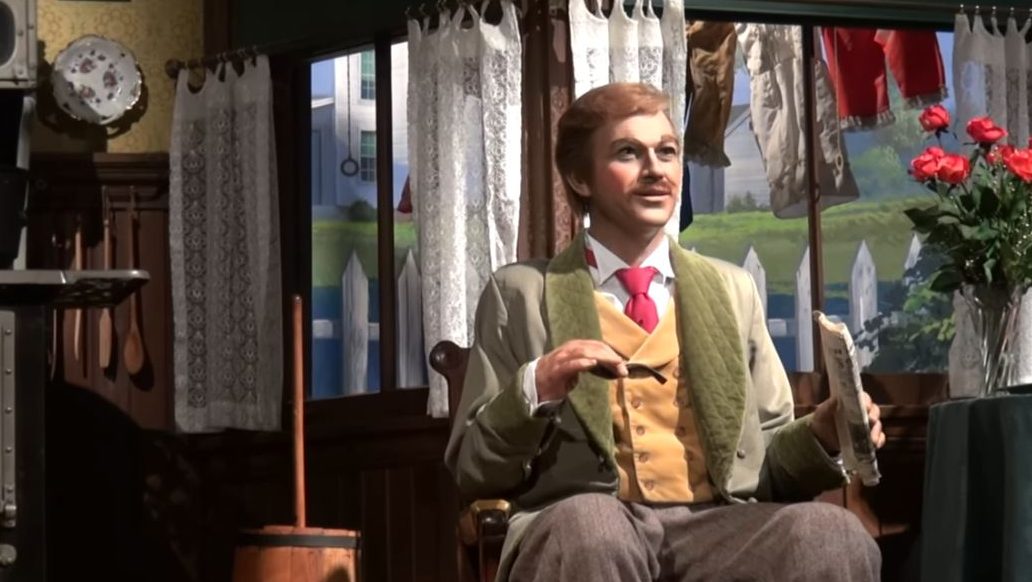The Carousel of Progress made its debut in Disneyland’s Tomorrowland district in 1967: it was an unnervingly cheerful audioanimatronic play about the glorious future that awaited humankind through the magic of science. It was shown in a rotating theater, with a jolly theme song that would stick in your head for about forever.
There’s a great big beautiful tomorrow
Shining at the end of every day;
There’s a great big beautiful tomorrow,
And tomorrow’s just a dream away!
Who today can still think of “tomorrow” as guaranteed to be great, or big, or beautiful? Maybe Steven Pinker, I guess.
For the whole of the previous century, America had become increasingly intoxicated by the possibilities of technology, reaching peak inebriation, perhaps, at Disneyland in the late Sixties. I was a child at that time, a native southern Californian, quite close perhaps to the Ground Zero of American optimism; I grew up in the unquestioning certainty that life would only get better and better as Science unlocked each successive mystery, heaping up new discoveries—new laws, new certainties, new marvels. Everything promised us this. The Jetsons, just as surely as Neil Armstrong. To say nothing of the “mystic crystal revelations” portended by the Age of Aquarius. There was just one way forward, and it was Up.
Progress! Bigger and bigger jet airplanes, faster and faster cars; the wires spidered their way over the earth. There were magical breakthroughs in medicine, industrial automation, broadcasting, information technology. Organ transplants, bypass surgery, the removal of brain tumors, the replacement of hips and knees. Agricultural revolutions right and left. That summer evening came, beyond which no one would ever see the moon quite the same way again.
You can almost trace American optimism through the nation’s feelings about NASA alone. In the 1970s the nation was so space-happy that parents bought these bleakly pasty, dry Space Food Sticks in metallic packets (just like the astronauts eat!) to put in their kids’ school lunches. They were really unappetizing!
Soon, very soon, everyone would be fed, healthy, educated, prosperous—technology was making all these things inevitable—so why would we ever need another war? Everyone would have the good life. And the glorious crescendo of Progress would come effortlessly, as if the human race were gliding toward its first Golden Age on an oiled track: it was all only a matter of time.
Then the next thirty years went by, and the 21st century awoke to something like a hangover.
Increasingly, it became evident that all that blithe certainty, that drunkenness on hope itself, had always carried within it the seeds of disaster. The twentieth century’s infatuation with technology had come with a host of unforeseen costs all along: climate change, pollution, overpopulation, a sick financial system, insanely destructive war machines, global economic instability.
Even so, in the face of all this manifestly evident miscalculation, our reliance on science remains unaccountably absolute to this very moment. Indeed, even now, with the appalling evidence before us, we find ourselves looking to “science”—to the wizards of the information age, to university researchers and medical experts—hoping against hope that they might keep us from going right over the edge of the Progress they themselves designed and sold to us and built for us.
All this was slow in coming, but we are now so deluded about “empirical proof” that we have come to believe that learning a statistic or looking a chart or ranking is the same thing as understanding; we are certain that Science always knows best, because of its reliance on “proof”—but these epistemological errors are at the very root of where we went wrong, and they are just exactly what has landed us in the soup.
Some things weren’t meant to be measured. While rounding a wide curve on the freeway to San Diego the other day, a big hospital with a huge banner across the top came into view, reading: “One of the Nation’s Top 50 Cardiovascular Hospitals.” But… are cardiovascular hospitals really a commodity that should be ranked?—that is, if more people die at your cardiovascular hospital than at mine, then I win? How have we deteriorated to the point where it’s acceptable for some hospitals to be “better” than others? And with a little foresight, you can improve the chances for surviving your bypass surgery on the hospital equivalent of Yelp?
Our era’s big mistake is in believing that what can be measured can be understood—and not just understood, but controlled. And we are already paying the price, as the unforeseen consequences of the 20th century’s progress unspool all around us.






